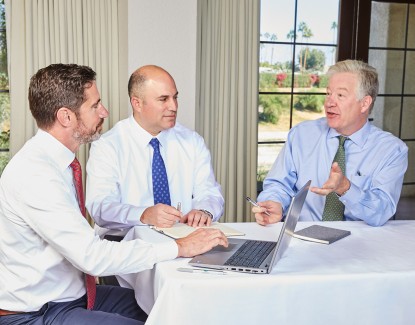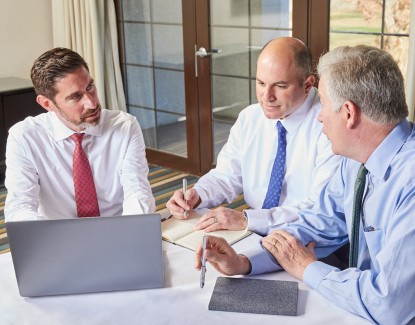Assessing the Impact of COVID-19 on the Fund
The Hennessy Focus Fund Managers discuss the impact of COVID-19 on the economy, the market and the portfolio. They describe how they position the portfolio for difficult economic environments as well as their investment case for RH, the Fund’s newest holding.
-
 David Rainey, CFACo-Portfolio Manager
David Rainey, CFACo-Portfolio Manager -
 Brian Macauley, CFACo-Portfolio Manager
Brian Macauley, CFACo-Portfolio Manager -
 Ira Rothberg, CFACo-Portfolio Manager
Ira Rothberg, CFACo-Portfolio Manager
What are your thoughts on the overall impact of COVID-19?
Over the last several weeks news of COVID-19 (coronavirus) has dominated the headlines, and increasingly our everyday lives. While effective, the country’s “social distancing” measures are highly disruptive to our daily routines and are causing significant hardship for many businesses and consumers.
As a result, we expect significant economic contraction in the short term, and continued pain in the intermediate term until a vaccine or highly effective therapeutic is widely available. Fortunately, fiscal and monetary response has been robust, and largely on target, limiting the risk of an uncontrolled downward spiral. With our nation’s productive capacity largely intact, we think that long-term GDP and corporate profits will not be significantly affected by this downturn.
As long-term investors, how is the portfolio positioned for difficult economic environments?
We fully expect that our portfolio will face difficult economic environments at various points during our investment horizon. We prepare for this eventuality, not by exiting stocks at the first sign of trouble, nor by rotating our portfolio into more conservative sectors, but rather by seeking to own companies that can survive a downturn, and often use that downturn to their advantage.
We seek to own superbly run companies with strong balance sheets that tend to be leaders in their industry. When times get tough, they are often in a position to go on offense by acquiring weaker competitors, introducing new products, or moving into new geographies. While the value created by such activities does not always reveal itself in the midst of a downturn, it becomes evident with the passage of time.
What have been the short- and long-term impacts on the portfolio?
While we regularly analyze how our businesses might perform in a recession, a global pandemic leading to a cessation of economic activity for an extended period of time is not something we had ever specifically contemplated. We have since stress tested each holding and its balance sheet for this new reality to see if businesses can survive three months, six months, or even a year of nationwide social distancing.
While most of our businesses will suffer short-term revenue and profit declines, in general, we feel very good about their ability to weather this storm. Approximately 69% of the portfolio is in companies that we think will handle this downturn with relative ease and approximately 30% of the portfolio is in companies that we think are facing significant short-term business disruption, but ultimately have the management team and balance sheet to see it through to the recovery.
In the short term, the market has painted with a broad brush. However, over time, we believe that the true value of the businesses in our portfolio will be recognized by the market as it becomes clear that they will not only make it through this downturn, but many will come out stronger and more profitable because of it.
What new investments have you made?
We have been reviewing our watch list and are actively considering several candidates for inclusion in the portfolio. At the end of the quarter, we added a new position in RH (formerly known as Restoration Hardware) at 1% assets. RH’s share price has been crushed in this downturn, declining 60% from its recent high. RH fits the prototype of investments we want to make now; it is cheap because it is suffering in the near term, but has solid leadership and liquidity, and should emerge much stronger after the downturn. RH is a leading luxury retailer in the home furnishings marketplace. The company is in the early innings of a transformational change to its real estate/store design strategy. RH is replacing its legacy mall-based stores with larger “design galleries” located primarily in prestigious off-mall locations. RH believes there is the potential for 60-70 design galleries in North America versus 22 today. The larger design galleries produce 2x the sales volume of legacy stores on lower occupancy and expense rates, resulting in 2-3x higher four-wall profit.
Over the last 19 years, CEO Gary Friedman has transformed RH from a nearly bankrupt purveyor of home accessories into arguably the leading luxury home brand in the world. Gary has 28% beneficial ownership of RH and is relentlessly focused on return on invested capital and capital allocation. Even with its stores closed due to the pandemic, we believe RH’s direct to consumer business (about 40% of sales) will allow the company to remain free cash flow positive. We think that RH is a well-run, high quality business with a large growth opportunity— a “compounder” — that we can likely hold for the long-term. Over time, should our continuing research reinforce our investment thesis, we will look to add to the position opportunistically.
- In this article:
- Domestic Equity
- Focus Fund
You might also like
-
 Portfolio Perspective
Portfolio Perspective
Focus FundSeeking Companies with Strong Growth at Attractive Valuations
 David Rainey, CFACo-Portfolio Manager
David Rainey, CFACo-Portfolio Manager Ira Rothberg, CFACo-Portfolio Manager
Ira Rothberg, CFACo-Portfolio Manager Brian Macauley, CFACo-Portfolio ManagerRead the Commentary
Brian Macauley, CFACo-Portfolio ManagerRead the CommentaryThe Portfolio Managers rely on their strategy of owning durable, well-run businesses capable of turning adversity into opportunity and adapting to macroeconomic surprises. The following Hennessy Focus Fund Commentary recaps the 2025 market and highlights areas of opportunity ahead.
-
 Portfolio Perspective
Portfolio Perspective
Focus FundFrom Rate Cuts to AI: Positioning the Portfolio for Potential Opportunity
 David Rainey, CFACo-Portfolio Manager
David Rainey, CFACo-Portfolio Manager Ira Rothberg, CFACo-Portfolio Manager
Ira Rothberg, CFACo-Portfolio Manager Brian Macauley, CFACo-Portfolio ManagerRead the Commentary
Brian Macauley, CFACo-Portfolio ManagerRead the CommentaryThe Portfolio Managers discuss holdings that could potentially benefit from lower rates, tariffs, and artificial intelligence (AI). The team also provides an update on AST SpaceMobile and discusses potential opportunities in select Technology and Health Care companies.
-
 Company Spotlight
Company Spotlight
Focus FundO’Reilly Automotive—Revved for Growth
 David Rainey, CFACo-Portfolio Manager
David Rainey, CFACo-Portfolio Manager Ira Rothberg, CFACo-Portfolio Manager
Ira Rothberg, CFACo-Portfolio Manager Brian Macauley, CFACo-Portfolio ManagerRead the Spotlight
Brian Macauley, CFACo-Portfolio ManagerRead the SpotlightO’Reilly Automotive is a leader in the automotive aftermarket parts industry in the U.S. The company’s scale, unique distribution infrastructure, and customer service-oriented culture should allow it to take market share in a fragmented U.S. market for years to come.
